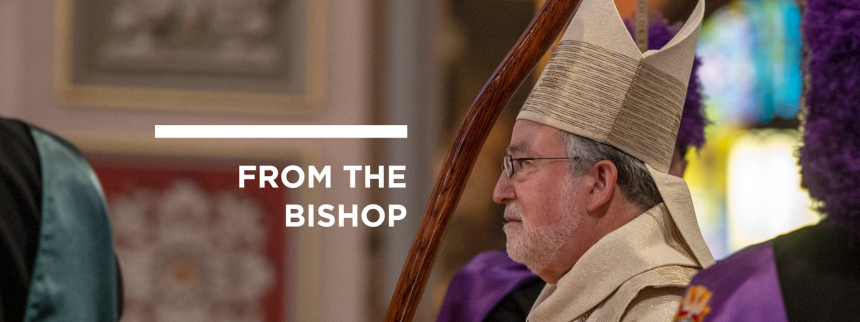
The Holy Father, Pope Francis, has designated a Holy Year in honor of St. Joseph, from Dec. 8, 2020 to Dec. 8, 2021. In making this announcement he is marking the 150th anniversary when one of his predecessors to the Chair of Peter, Pope Pius IX, declared St. Joseph the Patron of the Universal Church.
While marking this significant anniversary of the silent sentinel of the Holy Family, Pope Francis also noted the timeliness of leaning on the carpenter’s stalwart stature during these uncertain times of the pandemic. It has been more than a year since the coronavirus rattled our daily rhythms and clouded our future. No technological innovation, political ambition, or military adventure of recent times has been more globally disruptive than the COVID-19 contagion. Ideas of returning to normal are naively nostalgic as we ponder what a new normal will be. In this light, sitting with the pious figure of St. Joseph from St. Matthew’s Gospel (Mt 1:18-25) can help us find our way. He too was lost in the perplexing moments before the angel’s dream awakened him about the divine mystery to be born.
Reading the few Gospel accounts citing St. Joseph, we may forget the privileged perspective we enjoy. We know how the wisdom of God unfolded and human folly crumbled through the life, passion, death and resurrection of the Lord Jesus. Joseph knew none of this. His decisions were not the result of any foreknowledge about how God would redeem his people. He only knew what the angel told him: “Joseph, son of David, do not be afraid to take Mary your wife into your home. For it is through the Holy Spirit that this child has been conceived in her. She will bear a son and you are to name Him Jesus, because He will save his people from their sins” (Mt 1:20-21). Reading this Gospel text, we know of what the angel spoke. Joseph simply possessed his Jewish soul stirred by the deep longing for redemption.
Before this revelation came to Joseph in a dream, his heart trembled with turmoil knowing his betrothed, the young Mary of Nazareth, was with child. Two things were asked of Joseph: Do not be afraid; and take Mary your wife into your home. Joseph acted on these divine directions because he believed in God’s promise to redeem his people from their sins.
He knew nothing more, but what he believed was enough to embrace with courage and tenderness the unpredictable consecutive calamities that came in the wake of Mary’s crossing the threshold of Joseph’s home: a Roman census would order them to Bethlehem (Lk 2:1-5); local indifference to Mary’s pregnant predicament would force the improvised delivery in a manger (Lk 2.6-7); the curiosity of mangy shepherds (Lk 2:15-20); the astronomical speculations of Magi (Mt 2:1-12) would be imposed on the unexpecting family; a maniacal tyrant would drive them to Egypt (Mt 2:13-14); another restless dream would bring them back to Nazareth (Mt 2:19-23); the adolescent Jesus would try their patience with his emerging enthusiastic zeal for the Temple of Jerusalem (Lk 2:41-52). All this and more are what the trusting Joseph welcomed into his heart and home. He welcomed God’s redemption from sin, not on his own terms but as God chose to bring it about.
The mysterious providence of God operated in the realm of the unexpected and the surprising. Joseph surrendered his own will and cooperated with the unfathomable wisdom of God. The disposition of Joseph was not one of resignation or passivity. Like his young betrothed, Joseph offered himself to God and became his instrument for bringing about the world’s salvation. A graced, merciful harmony existed between the Almighty God and the simple carpenter from Nazareth.
Joseph was not paralyzed by the twists and turns of events. In each moment, he chose to be faithful in whatever manner God came to him. His fidelity was tethered to his marital bond with Mary. From the moment he accepted Mary into his home, all other scriptural references to Joseph portrayed him at her side caring for the young Jesus. At no point was there a story just about Joseph. His whole life can only be understood as part of the mission of Jesus. This was not an editorial omission by the evangelists; it was how Joseph chose to live, faithfully serving Mary and her child, Jesus.
To some minds, Joseph disappeared during the public ministry of Jesus, except for the references identifying Jesus as the son of the carpenter (Mt 13:55). With more attentive reflection, we see the echoes of Joseph’s caring craft in the manner of Jesus’ own ministry. Though He was the Son of God, Jesus learned the ways by which his humanity would reveal his divinity under the tutelage of Mary and Joseph. His Galilean accent, as Jesus spoke of his heavenly Father, sounded like the carpenter’s voice. His custom of visiting synagogues was learned from following Joseph’s pious habits. His ability to engage fishermen, tax collectors, and others copied the social manners of his protector. On the night before he died, as Jesus gathered with his disciples for the Passover, he assumed the role that Joseph would have performed as head of the household conducting the ancient Seder meal. In all these subtle ways, we see how much Joseph was essential to the mission of Jesus.
More than all the quiet hints of the legacy of Joseph’s handiwork in the life of Jesus, the Lord Jesus was always obedient to the Divine Father’s will amidst the many twists and turns of his earthly ministry. This was true of his divine nature; he was also true to the example Joseph humbly and heroically demonstrated while Jesus was a young boy. Whether we speak of God the Father, or Joseph the foster father of Christ, we can confidently say about Jesus: like Father like Son.

